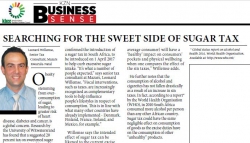Searching for the sweet side of sugar tax: Leonard Willemse, Senior Tax Consultant, Mazars KwaZulu-Natal2016-04-28 Obesity stemming from overconsumption of sugar, leading to greater risk of heart disease, diabetes and cancer, is a global concern. Research by the University of Witwatersrand has found that a suggested 20
percent tax on sweetened sugar beverages (SSBs) could possibly reduce obesity in around 220 000 adults. SSBs include, among other things: still and carbonated soft drinks, fruit juices, sports drinks, energy drinks and vitamin waters, sweetened ice tea, lemonade, and cordials and squashes. In his 2016 Budget speech, Finance Minister Pravin Gordhan confirmed the introduction of a sugar tax in South Africa, to be introduced on 1 April 2017 to help curb excessive sugar intake. "It's what a number of people expected," says senior tax consultant at Mazars, Leonard Willemse. "Fiscal interventions, such as taxes, are increasingly recognised as complementary tools to help influence people's lifestyles in respect of consumption. This is in line with what many other countries have already implemented - Denmark, Finland, France, Ireland, and Mexico, for example." Willemse says the intended effect of sugar tax can be likened to the current excise duties levied on cigarettes and alcoholic beverages, in order to promote healthier lifestyles and physical wellness among South Africans. "Although a noble idea from a health perspective, it remains to be seen whether the addition of another socalled 'stealth tax' (a tax that slips under the radar of the average consumer) will have a 'healthy' impact on consumers' pockets and physical wellbeing when one compares the effect of the sin taxes," Willemse adds. He further notes that the consumption of alcohol and cigarettes has not fallen drastically as a result of an increase in sin taxes. In fact, according to a report* by the World Health Organisation (WHO), in 2010 South Africa consumed more alcohol per person than any other African country. Sugar tax could have the same negligible effect on consumption of goods as the excise duties have on the consumption of other "unhealthy" products. "Simply put, those who love drinking sweetened beverages might continue to do so even though it might cost more. So consumers might still consume a considerable amount of sugar, resulting in a bitter taste for the wallet. Government, however, will enjoy a sweet taste in the form of additional revenue," Willemse concludes. * Global status report on alcohol and health 2014, World Health Organisation, Available at: http://www.who.int/substance_abuse/publications/global_alcohol_report/en/ Mazars KZN: www.mazars.co.za |
Searching for the sweet side of sugar tax: Leonard Willemse, Senior Tax Consultant, Mazars KwaZulu-Natal
Copyright © 2024 KwaZulu-Natal Top Business
